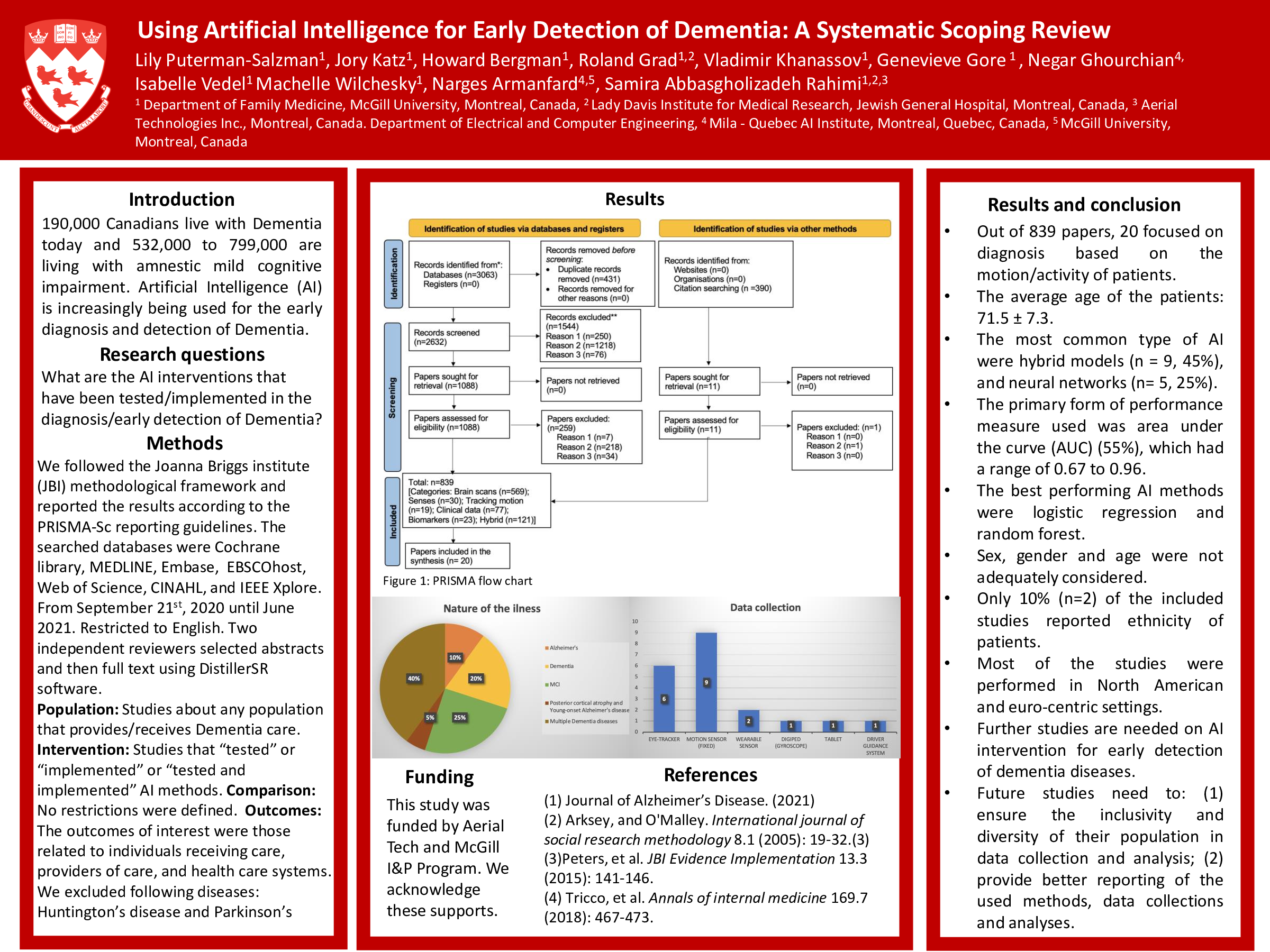PRP099: Using Artificial Intelligence for Diagnosis of Dementia: A Systematic Scoping Review
Lily Puterman-Salzman; Jory Katz; Samira Rahimi, PhD, Eng; Narges Armanfard; Vladimir Khanassov, MD, MSc; Roland Grad, MD, CCFP, FCFP; Isabelle Vedel, MD, PhD; Genevieve Gore, MLIS; Howard Bergman, MDCM; Negar Ghourchian, PhD
Abstract
Context: Dementia is a neurodegenerative disease resulting in the loss of cognitive and psychological functions such as memory loss, confusion and personality changes. It is an extremely difficult diagnosis not only for the patient, but also for their loved ones and care providers. With the increasingly aging population, it is important to timely diagnose dementia. Artificial intelligence (AI) may help in early diagnoses and screening of dementia, however, little is known in this area.
Objective: To identify and evaluate AI interventions that advance the diagnosis or improve the understanding of the prognosis of dementia.
Study design: A scoping review was conducted using the Joanna Briggs Institute framework, and enhanced methodological framework for scoping reviews by Levac et al. The PRISMA-Sc guidelines for scoping reviews were used for development of the protocol and reporting of the review.
Dataset: An information specialist performed a comprehensive search from September 21st 2020 until June 2021 on six databases (i.e., Cochrane Library, MEDLINE, EMBASE, EBSCOhost, Web of Science, CINAHL, and IEEE Xplore). AI interventions, which were implemented or tested in health care settings, were included. The reference lists of included studies were screened. Articles in the English language only were included.
Population studied: Patients with dementia and other neurodegenerative diseases (Alzheimer’s disease, Pick’s Disease, Lewy body Disease, Mild Cognitive Impairment, frontotemporal disorders and vascular dementia) and their care providers were included. Studies were excluded if they focused on diagnosing Parkinsons or Huntington’s disease.
Outcome measures: Any outcome related to patients (e.g., health related and psychological related outcomes), health care providers (e.g., health care provider acceptance, health care provider satisfaction) and the health care system (e.g., direct and indirect health costs, use of health system services, any other health system performance indicator).
Results: After removing duplicates, 2,632 articles were identified. Two independent reviewers conducted title and abstract screening (level 1) and full text screening (level 2). 839 articles were included. The authors categorized the included papers into 6 categories (brain scans, senses, sensors tracking movement, clinical data, biomarkers, and hybrid). This is an ongoing review and the data extraction step is in progress. Preliminary results will be presented.
Objective: To identify and evaluate AI interventions that advance the diagnosis or improve the understanding of the prognosis of dementia.
Study design: A scoping review was conducted using the Joanna Briggs Institute framework, and enhanced methodological framework for scoping reviews by Levac et al. The PRISMA-Sc guidelines for scoping reviews were used for development of the protocol and reporting of the review.
Dataset: An information specialist performed a comprehensive search from September 21st 2020 until June 2021 on six databases (i.e., Cochrane Library, MEDLINE, EMBASE, EBSCOhost, Web of Science, CINAHL, and IEEE Xplore). AI interventions, which were implemented or tested in health care settings, were included. The reference lists of included studies were screened. Articles in the English language only were included.
Population studied: Patients with dementia and other neurodegenerative diseases (Alzheimer’s disease, Pick’s Disease, Lewy body Disease, Mild Cognitive Impairment, frontotemporal disorders and vascular dementia) and their care providers were included. Studies were excluded if they focused on diagnosing Parkinsons or Huntington’s disease.
Outcome measures: Any outcome related to patients (e.g., health related and psychological related outcomes), health care providers (e.g., health care provider acceptance, health care provider satisfaction) and the health care system (e.g., direct and indirect health costs, use of health system services, any other health system performance indicator).
Results: After removing duplicates, 2,632 articles were identified. Two independent reviewers conducted title and abstract screening (level 1) and full text screening (level 2). 839 articles were included. The authors categorized the included papers into 6 categories (brain scans, senses, sensors tracking movement, clinical data, biomarkers, and hybrid). This is an ongoing review and the data extraction step is in progress. Preliminary results will be presented.

Diane Harper
harperdi@med.umich.edu 11/21/2021scoping reviews always ground you in the current study designs and outcomes - so that you can improve on the study designs and define measurable outcomes that are clinically meaningful. Thank you for brining this to NAPCRG.